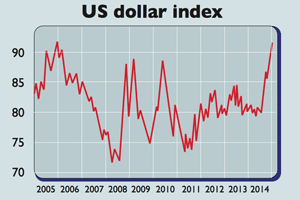The dollar will keep climbing
The greenback has hit a multi-year high against over major currencies, with more to come.

Get the latest financial news, insights and expert analysis from our award-winning MoneyWeek team, to help you understand what really matters when it comes to your finances.
You are now subscribed
Your newsletter sign-up was successful
Want to add more newsletters?

Twice daily
MoneyWeek
Get the latest financial news, insights and expert analysis from our award-winning MoneyWeek team, to help you understand what really matters when it comes to your finances.

Four times a week
Look After My Bills
Sign up to our free money-saving newsletter, filled with the latest news and expert advice to help you find the best tips and deals for managing your bills. Start saving today!
In the forex market the first few days of 2015 have looked just like 2014: "positive US sentiment fuelling US dollar gains", says Jeremy Stretch of CIBC.
The US dollar index, which tracks the currency against a basket of currencies of America's major trading partners, has hit its highest level since 2006. Last year it rose by 13%, its best year since 2005. The dollar also reached a nine-year high against the euro.
This bull market looks far from over. The US economy looks the strongest of all the developed economies and is expected to grow at its fastest pace in a decade over the next two years. The US consumer, who accounts for around 70% of GDP, "is in good shape and is going to hold up this recovery", says IHS Global Insight's Nariman Behravesh.
MoneyWeek
Subscribe to MoneyWeek today and get your first six magazine issues absolutely FREE

Sign up to Money Morning
Don't miss the latest investment and personal finances news, market analysis, plus money-saving tips with our free twice-daily newsletter
Don't miss the latest investment and personal finances news, market analysis, plus money-saving tips with our free twice-daily newsletter
Consumer confidence is at an eight-year high. And no wonder falling petrol prices, if they continue, should amount to a saving of $750 for the average family. Mortgage payments as a share of disposable income are at a 30-year low. And the strong labour market suggests that salaries should rise soon.
The encouraging economic outlook suggests that the Federal Reserve will have to raise interest rates. That would in turn raise the yield available on assets priced in the US currency. It also helps that the dollar's major rivals are heading in the opposite direction.

Japan and the eurozone aren't the only countries attempting to escape disinflation or deflation. "In many countries, currency weakness is now being used as a tool to import inflation or head off the deflation threat," as HSBC's David Bloom points out on zawaya.com.
Many economies, both emerging and developed, will welcome a weaker currency this year and are hardly likely to stand in the way of a rising dollar trend. Another dollar-positive trend is the surge in US oil output, which is reducing oil imports and hence the US current-account deficit.
The upshot is that the euro-dollar rate will decline to $1.14 by next year, says Morgan Stanley. There is also scope for further gains against the pound: the Fed has sounded more hawkish of late while the Bank of England only seems likely to raise interest rates towards the end of the year.
'Cable', as the US dollar-pound cross is known, will drift down to $1.45 in 2015, reckons Morgan Stanley, from $1.52 now.
Get the latest financial news, insights and expert analysis from our award-winning MoneyWeek team, to help you understand what really matters when it comes to your finances.

-
 Should you buy an active ETF?
Should you buy an active ETF?ETFs are often mischaracterised as passive products, but they can be a convenient way to add active management to your portfolio
-
 Power up your pension before 5 April – easy ways to save before the tax year end
Power up your pension before 5 April – easy ways to save before the tax year endWith the end of the tax year looming, pension savers currently have a window to review and maximise what’s going into their retirement funds – we look at how